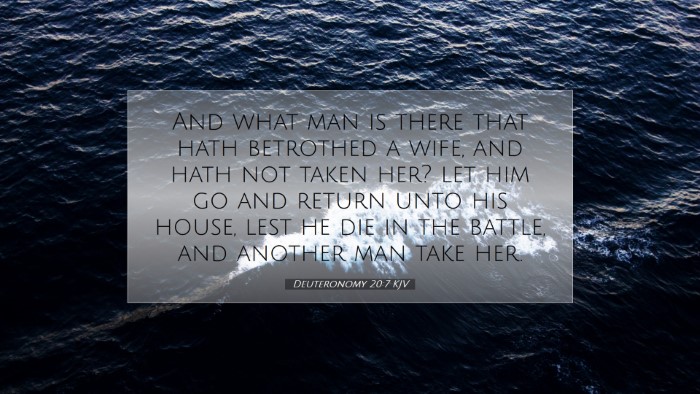Deuteronomy 20:7 Commentary
Verse: "And what man is there that hath betrothed a wife, and hath not taken her? let him go and return unto his house, lest he die in the battle, and another man take her."
Introduction
This verse addresses the provisions for soldiers who are about to engage in battle, specifically focusing on the importance of personal commitments and obligations. The words of Moses remind the people of the necessity for proper prioritization in times of war, embodying a principle of compassion and social order amidst the chaos of conflict.
The Context of Deuteronomy 20
Deuteronomy chapters 20 outlines God’s instructions for warfare, emphasizing the spiritual and moral responsibilities of Israelite soldiers. In these passages, Moses speaks to the nation of Israel as they are about to enter the Promised Land, highlighting the need for readiness tempered with divine law.
Moses' Leadership
Moses' leadership here is vital; he conveys not just military strategy but also God’s overarching care for His people. The call to remember one’s family ties and obligations suits Moses' role as a shepherd, nurturing a sense of community even in the face of warfare.
Insights from Public Domain Commentaries
Matthew Henry's Commentary
Matthew Henry emphasizes that this exemption reflects God's mercy and acknowledgment of human affection and relationships. He states:
“This law shows the graciousness of God, who provides for the peace of families, even amidst the tumult of war. Those who have taken upon themselves the bonds of a new marriage should be released from the burdens of battle to tend to their wedded duties.”
Henry also points out the societal implications of this command. By allowing a newly married man to abstain from battle, God underscores the sanctity of marriage and suggests that family and community should take precedence, even in grave situations like war.
Albert Barnes' Notes
Albert Barnes adds to this understanding by noting:
“This commandment establishes the principle that personal obligations, particularly those formed by marriage, carry a weight that should not be dismissed lightly. It serves as a reminder that the welfare of families is a priority, particularly during times of national crisis.”
Barnes elucidates that this statute reflects God's concern for the moral state of the nation. By allowing men to attend to their homes before going to battle, He indicates that moral integrity and responsibility cannot be set aside even in warfare.
Adam Clarke's Commentary
Adam Clarke provides an interesting perspective regarding the social context of marriage during this period. He observes:
“In ancient times, marriage was often a crucial social contract. To engage in warfare without having fulfilled these duties could lead to social instability, making it vital that those who have recently married be excluded from the battle.”
This insight highlights the community's reliance on solid familial structures. Clarke's analysis ties the intimate relationship of marriage to the broader social fabric of Israel, suggesting that strong families contribute to a strong nation.
Theological Reflections
The verse highlights significant theological themes such as God's concern for human relationships, the impact of war on society, and the moral responsibilities that citizens hold. It reveals that even in the strictness of war, God calls for compassion and prioritization of family. It raises questions about the nature of civilian sacrifices in times of national crises, a relevant discourse for current theological reflection.
Practical Applications
For pastors, students, and theologians, this verse imparts critical lessons about responsibilities:
- Prioritization of Commitments: The notion that personal obligations should take precedence can reframe how contemporary believers consider their commitments in the spiritual and secular realms.
- The Value of Relationships: It teaches the importance of family relationships, reminding us that they ought to be nurtured even amid life's battles, be they personal or communal.
- Divine Compassion: This verse exemplifies God's merciful character, calling us to emulate this compassion in our ministry and interpersonal dealings.
Conclusion
Deuteronomy 20:7 serves as a reminder that in times of war, amidst the tumult, God’s care for the personal and familial aspects is never neglected. The insights from Matthew Henry, Albert Barnes, and Adam Clarke converge to illuminate the need for a balance between duty and personal commitments. As this principle is explored, it continues to resonate with contemporary heart and mind, encouraging us to remember our obligations while engaging with the world around us.


